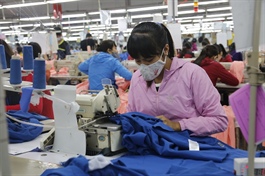Farm produce exports to Australia grow despite COVID-19
Farm produce exports to Australia grow despite COVID-19
Despite the difficulties in international trade activities brought on by COVID-19, exports of Vietnamese agricultural products to Australia have enjoyed positive growth thanks to their high quality, diverse brands, and trade promotion activities.

Ngo Tuong Vy, deputy director of Chanh Thu Fruit Import-Export Limited Company in the Mekong Delta Province of Ben Tre, told Viet Nam News that during the pandemic her firm switched to promoting the consumption of processed frozen products, achieving unexpected success, especially frozen Ri6 durian, which have won the trust of Australian consumers.
“Our frozen Ri6 durian products in Australia are constantly sold out. They are appreciated by both Vietnamese and Chinese supermarkets," Vy told Viet Nam News, revealing that two or three containers of Ri6 durian products are being shipped to the market each week.
Her firm plans to cooperate alongside other localities to expand durian growing areas, to meet the growing export demand.
The Ha Noi based-Uu Dam Company recently exported 2,000 fresh wax coconuts from Tra Vinh Province to this market by air. It offered the new product at a price of roughly US$26 apiece and got the nod from the importer.
According to Nguyen Phu Hoa, head of the Vietnamese Trade Office in Australia, two-way trade topped $9.1 billion over the past nine months of 2021, a year-on-year surge of 50 per cent.
It is noteworthy that farm produce exports expanded by 32 per cent year-on-year in the period. Of which, exports of vegetables and fruits increased by 32.27 per cent on-year, seafood by 22.48 per cent and rice by 25.43 per cent.
Australia is positioned as a country with a developed farming sector, which is capable of producing a relatively high output of rice. But while Australian firms have recently reduced rice imports from other countries, they are still purchasing a large volume from Viet Nam.
Besides rice, Viet Nam is now the largest pepper exporter to Australia, with an export proportion accounting for between 50 and 60 per cent. Last year, the country shipped 2,630 tonnes of pepper to Australia, a yearly rise of 30.47 per cent.
Meanwhile, Vietnamese coffee exports to this market in September soared by 41 per cent compared to the previous month, and consumer demand is forecast to continue rising. These positive figures have confirmed the brand and quality of Vietnamese agricultural products.
Hoa also said that Vietnamese brands had been gaining increasing trust in Australia thanks to trade promotion activities that better advertise brands of Vietnamese products and increasing efforts made by businesses.
The office had actively implemented digitisation of business support activities in the context of the COVID-19 pandemic, including launching an application to connect Vietnamese businesses and localities with Australian partners and organising large-scale online exhibitions, he noted.
As a way of introducing Vietnamese goods to Australian consumers, a range of trade promotion activities had been deployed, including a durian marketing campaign in which Australian people were invited to taste durian fruit on an antique car on the streets of Sydney. The office also launched other promotion programmes such as “Viet Nam, Land of World's Best Rice” and “Viet Nam Cashew Week” in Melbourne.
The office also launched an application called Viet-Aus Trade to support export businesses, as well as to provide information on products and investment opportunities. With this application, businesses can directly contact the office to find updated market information and support for problems that arise.
At the same time, businesses paid due attention to gaining Certificates of Origin for their products in a bid to be exempted from tariffs under the free trade agreements that Viet Nam has inked bilaterally and multilaterally with many countries and blocs, Hoa added.
According to him, maintaining the quality of products is the most important factor to keep a competitive advantage, even when the COVID-19 pandemic is over because Australia is one of the most demanding markets in the world with many requirements for product quality standards and strict import processes. It is also a market with abundant domestic agriculture.
The standard of living of Australians is always recognised as one of the best in the world. They are willing to pay high prices for fruit and food items if they feel satisfied with these products.
Along with trade promotional drives, businesses should grasp customer tastes to improve overall product quality and build stronger brands for their products to meet stringent requirements set by the Australian market.
Vy from Chanh Thu Fruit Import-Export Co agreed. She emphasised the importance of surveying the tastes of customers and products of competitors to find out suitable products for the Australian market.
"Ensuring product quality will be a key for the firms' success at the market," Vy told Viet Nam News, adding that high-quality products that can be sold at higher prices should be prioritised.
She also called for more support from the Vietnamese Trade Office in Australia and other relevant agencies in popularising Vietnamese farm produce in Australia, so that Vietnamese exporters can promote their exports to this lucrative market.
Director of the Trade Promotion Agency (VIETRADE) under the Ministry of Industry and Trade Vu Ba Phu was quoted as saying that VIETRADE would always accompany businesses and localities in developing and advertising brands of Vietnamese products especially farm produce.
At the same time, the agency would continue to co-operate with the Vietnamese trade offices in foreign countries, including Australia, to search and connect Vietnamese firms with potential customers amid the context that the COVID-19 pandemic has gradually controlled in the world, resulting in increasing import demands.
























